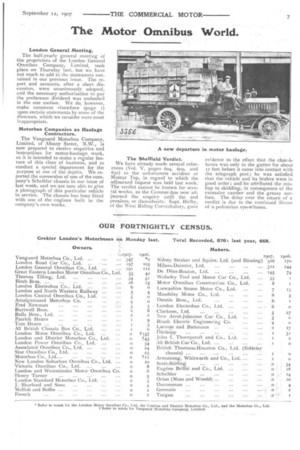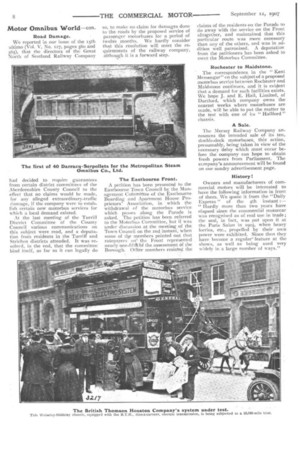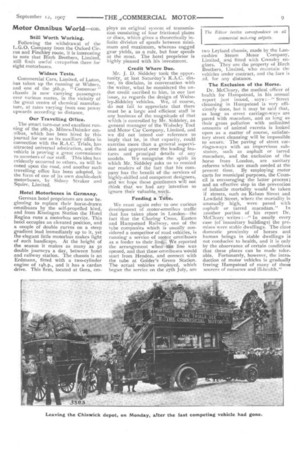The Motor Omnibus World.
Page 7

Page 8

Page 9

If you've noticed an error in this article please click here to report it so we can fix it.
London General Meeting.
The half-yearly general meeting of the proprietors Of the London General Omnibus Company, Limited, took place on Thursday last, but we have not much to add to the statements contained in our previous issue. The report and accounts, after a short discussion, were unanimously adopted, and the necessary authorisation to pay the preference dividend was embodied in the one motion. We do, however, make comment elsewhere (page 1) upon certain statements by some of the directors, which we consider were most inappropriate.
Motorbus Companies as Haulage Contractors.
The Vanguard Motorbus Company, Limited, of Albany Street, N.W., is now prepared to receive enquiries and instructions for motor-haulage work, as it is intended to make a regular feature of this class of business, and to conduct a special department for the purpose at one of the dep6ts. We reported the conversion of one of the company's Scheibler chassis in our issue of last week, and we are now able to give a photograph of this particular vehicle in service. The chassis has been fitted with one of the engines built in the company's own works. The Sheffield Verdict.
We have already made several refer.. ences (Vol. V, pages 604, 609, and 632) to the unfortunate accident at Moscar Top, in regard to which the adjourned inquest was held last week. The verdict cannot be known for several weeks, as the Coroner. has now adjourned the enquiry until the 2nd proximo, or thereabouts. Supt. Bielby, of the West Riding Constabulary, gave
evidence to the effect that the char-abanes was only in the gutterfor about 12 feet before it came into contact with the telegraph post ; he was satisfied that the vehicle and its brakes were in good order ; and he attributed the mishap to skidding, in consequence of the excessive camber and the greasy surface. The delay ever the return of a verdict is due to the continued illness of a pedestrian eye-witness. Road Damage.
We reported in our issue of the t5th ultimo (Vol. V, No. 127, pages 56o and 565), that the directors of the Great North of Scotland Railway Company had decided to require guarantees from certain district committees of the Aberdeenshire County Council to the effect that no claims would be made, for any alleged extraordinary-traffic damage, if the company were to establish certain new motorbus services for which a local demand existed.
At the last meeting of the Turriff District Committee of the County Council various communications on this subject were read, and a deputation from residents in the Turriff and Strichen districts attended. It was resolved, in the end, that the committee bind itself, as far as it can legally do
so, to make no claim for damages done to the roads by the proposed service of passenger motorbuses for a period of twelve .months. We hardly consider that this resolution will meet the requirements of the railway company, although it is a forward step.
The Eastbourne Front.
A petition has been presented to the Eastbourne Town Council by the Management Cothrtrittee of the Eastbourne Boarding and Apartment House Proprietors' Association, in which the withdrawal of the motorbus service which passes along the Parade is asked. The petition has been referred to the Motorbus Committee, but it was under discussion at the meeting .of the Town Council on the znd instant, when some of ar members pointed out that ratepayers on the Front represented nearly one-fiftfirbf the assessment Of the Borough. Other members resisted the
claims of the residents on the Parade to do away with the service on the Front altogether, and maintained that this particular route was more necessary than any of the others, and was in addition well patronised. A deputation from the petitioners has been asked to meet the Motorbus Committee.
Rochester to Maidstone.
The correspondence in the "Kent Messenger" on the subject of a proposed motorbus service between Rochester and Maidstone continues, and it is evident that a demand for such facilities exists. We hope J. and E. Hall, Limited, of Dartford, which company owns the nearest works where motorbuses are made, will be able to put the matter to the test with one of its " Hallford " chassis.
A Sale.
The Mersey Railway Company announces the intended sale of its ten, double-deck motorbuses, this action, presumably, being taken in view of the necessary delay which must occur before the company can hope to obtain fresh powers from Parliament. The cempany's announcement will be found on our sundry advertisement page.
History!
Owners and manufacturers of commercial motors will be interested to have the following information in front of them. We quote it from the "Daily Express " of the 4th instant :— "Hardly more than two years have elapsed since the commercial motorcar was recognised as of real use in trade; the seal, in fact, was put upon it at the Paris Salon in 1905, when heavy lorries, etc., propelled by their own power were exhibited. Since then they have become a regular' feature at the shows, as well as being used very widely in a large number of ways." Still Worth Working. Following the withdrawal of the L.G.O. Company from the Oxford Circus and Finchley route, it is interesting to note that Birch Brothers, Limited, still finds useful cccupation there for eight motorbuses.
Widnes Tests.
Commercial Cars, Limited, of Luton, has taken up the running at Widnes, and one of the 36h.p. " Comercar " chassis is now carrying passengers over various routes, in the vicinity of the great centre of chemical manufacture, at rates varying from one penny upwards according to distance.
Our Travelling °Mee.
The smart turn-out and excellent running of the 28h.p. Milnes-Daimler omnibus, which has been hired by this journal for use as its auxiliary ciffice in connection with the R.A.C. Trials, has attracted universal admiration, and the vehicle is proving a great convenience to members of our staff. This idea has evidently occurred to others, as will he noted upon the road, and another such travelling office has been adopted, in the form of one of its own double-deck motorbuses, by Sidney Straker and Squire, Limited.
Hotel Motorbuses in Germany.
German hotel proprietors are now beginning to replace their horse-drawn omnibuses by the self-propelled kind, and from Kissingen Station the Hotel Regina runs a motorbus service. This hotel occupies an elevated position, and a couple of double curves on a steep gradient lead immediately up to it, yet the elegant little motorbus makes light of such handicaps. At the height of the season it makes as many as so double journeys a day, between hotel and railway station. The chassis is an Erdmann, fitted with a two-cylinder engine of i4h.p., and it has a cardan drive. This firm, located at Gera, ern
ploys an original system of transmission consisting of four frictional plates or discs, which gives a theoretically infinite division of speeds between minimum and maximum, whereas cogged gear yields, as a rule, but four speeds at the most. The hotel proprietor is highly pleased with his investment.
Credit Where Due.
Mr. J. D. Siddeley took the opportunity, at last Saturday's K.A.C. dinner, to disclaim, in conversation with the writer, what he considered the undue credit ascribed to him, in our last issue, as regards the design of Wolseley-Siddeley vehicles, We, of course, do not fail to appreciate that there must be a large and efficient staff in any business of the magnitude of that which is controlled by Mr. Siddelev, as general manager of the Wolseley -Tool and Motor Car Company, Limited, and we did not intend our reference to imply that he, in that capacity, could exercise more than a general supervision and approval over the leading features and principal details of any models. We recognise the spirit in which Mr. Siddeley asks us to remind our readers of the fact that his company has the benefit of the services of highly-skilled and competent designers, and we hope those gentlemen will not think that we had any intention to ignore their valuable work.
Feeding a Tube.
We must again refer to one curious development of motor-omnibus traffic that has taken place in London—the fact that the Charing Cross, Euston and Hampstead Railway, one of the tube companies which is usually considered a competitor of road vehicles, is running a service of motor omnibuses as a feeder to their line ,F„ We reported the arrangement when-e line was opened, and that these omnibuses would start from Hendon, and connect with the tube at Golder's Green Station. The actual vehicles employed, which began the service on the 27th July, are
two Leyland chassis, made by the Lan cashire Steam Motor Company, Limited, and fitted with Crossley engines. They are the property of Birch Brothers, Limited, who maintain the vehicles under contract, and the fare is 2d. for any distance.
The Exclusion of the Horse. Dr. McCleary, the medical officer of health for Hampstead, in his annual report just issued, says :—" Street cleansing in Hampstead is very efficiently done, but it may be said that, as long as street carriage-ways are paved with macadam; and as long as their gross pollution with unlimited amounts of animal excreta is looked upon as a matter of course, satisfactory street cleansing will be impossible to secure. The paving of street carriage-ways with an impervious substance, such as asphalt or tarred macadam, and the exclusion of the horse from London, are sanitary reforms which are much needed at the present time. By employing motor carts for municipal purposes, the Council is encouraging the latter process ; and an effective step in the prevention of infantile mortality would be taken if streets, such as Kelsort Street and Lowfield Street, where the mortality is unusually high, were paved with asphalt or tarred macadam." In another portion of his report Dr. McCleary writes :—" In nearly every case (of insanitary buildings) the premises were stable dwellings. The close domestic proximity of horses and human beings in stable dwellings is not conducive to health, and it is only by the observance of certain conditions that these places can be made toler. able. Fortunately, however, the introduction of motor vehicles is gradually freeing Hampstead of many of these sources of nuisance and ill-health."




























